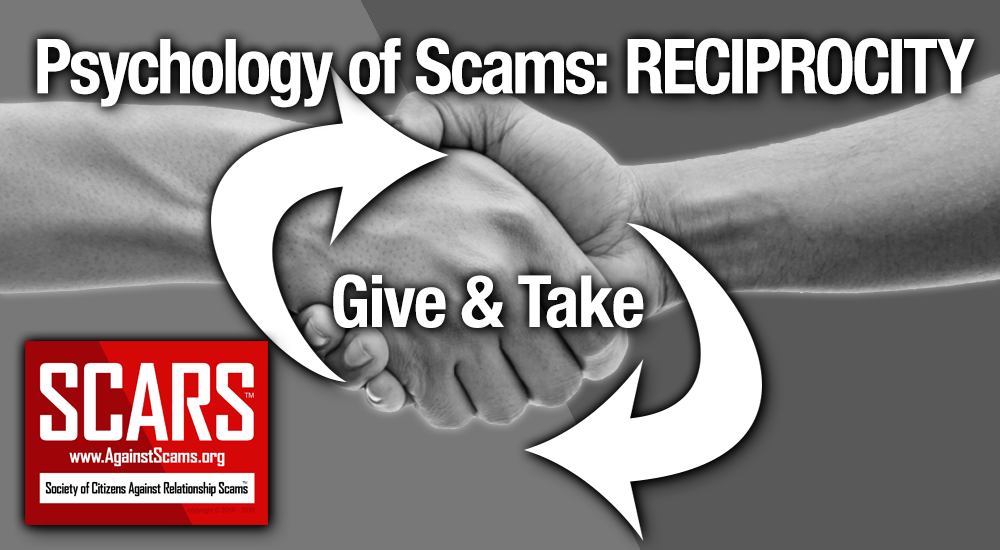
SCARS Institute’s Encyclopedia of Scams™ Published Continuously for 25 Years

SCARS™ Psychology of Scams: Reciprocity Rule & Scams
Definition Of Reciprocity
In social psychology, reciprocity is a social norm of responding to a positive action with another positive action, rewarding kind actions. As a social construct, reciprocity means that in response to friendly actions, people are frequently much nicer and much more cooperative than predicted by the self-interest model; conversely, in response to hostile actions, they are frequently much nastier and even brutal.
[lwptoc]Reciprocity is also a technique of Social Engineering.
We See Two Immediate Examples Of This In The World Of Scams:
- Scam victims respond to the initial exchange of information with more information
- Haters and trolls go nuclear when confronted
Introduction To Reciprocity
Reciprocity makes it possible to build continuing relationships and exchanges. In some cases, this can happen quickly.
Fukuyama states that “If the institutions of democracy and capitalism are to work properly, they must coexist within certain premodern cultural habits that ensure their proper functioning” (p. 11). He goes on to say “Law, contract, and economic rationality and prosperity…. must as well be leavened with reciprocity, moral obligation, duty toward community, and trust…. The latter are not anachronisms in a modern society but rather the sine qua non of the latter’s success” (p. 11) According to the sociologist Alvin Gouldner (1960), this norm is nearly universal, and only a few members of society—the very young, the sick, or the old—are exempt from it.
This Reciprocity can form the basis for the initial tendencies towards trust of a stranger in the early stages of a scam and can be used in the ongoing manipulation of scam victims.
Reciprocal actions differ from altruistic actions in that reciprocal actions only follow from others’ initial actions, while altruism is the unconditional act of social gift-giving without any hope or expectation of future positive responses. Some distinguish between ideal altruism (giving with no expectation of future reward) and reciprocal altruism (giving with the limited expectation or the potential for an expectation of future reward). [For more information on this idea, see altruism or altruism (ethics) in Wikipedia.]
In this article, we will explore both Reciprocity and its role in the scammer’s manipulation of the victim
RECIPROCITY
An Adaptive Mechanism
Scientists Richard Leakey and Roger Lewin attribute the very nature of humans to reciprocity.
They claim humans survived because our ancestors learned to share goods and services “in an honored network of obligation”. Thus, the idea that humans are indebted to repay gifts and favors is a unique aspect of human culture. Cultural anthropologists support this idea in what they call the “web of indebtedness” where reciprocity is viewed as an adaptive mechanism to enhance survival. Within this approach, reciprocity creates an interdependent environment where labor is divided so that humans may be more efficient.
For example, if one member of the group cares for the children while another member hunts for food for the group, each member has provided a service and received one in return. Each member can devote more time and attention to his or her allotted task and the whole group benefits. This meant that individuals could give away resources without actually giving them away. Through the rule of reciprocity, sophisticated systems of aid and trade were possible bringing immense benefits to the societies that utilized them. Given the benefits of reciprocity at the societal level, it is not surprising that the norm has persisted and dictates our present cognition and behavior.
In the context of scams, it represents a power to pull in the victims through small acts of expressed kindness, such as complements, listening & attention, and sharing their own secrets (even if later determined to be fake). Even that act of (supposedly) allowing the victim to sends a gift (such as money) can be considered an act that further controls the victim, inducing a reciprical action – usually in the form of trust.
The Power Of Reciprocity
Reciprocity is not only a strong determining factor of human behavior; it is a powerful method for gaining a person’s compliance with a request.
The rule of reciprocity has the power to trigger feelings of indebtedness even when faced with an uninvited favor and irrespective of liking the person who executed the favor.
In 1971, Dennis Regan tested the strength of these two aspects of reciprocity in a study where participants believed they were in an art appreciation experiment with a partner, “Joe”, who was really Regan’s assistant. During the experiment, Joe would disappear and bring back a soft drink for the participant. After this phase of the experiment was over, Joe would ask the participant to buy raffle tickets from him. The more the participants liked Joe, the more likely they were to buy raffle tickets from him. Does this sound similar to scams? However, when Joe had given them a soda and thus indebted them to reciprocate, it made no difference whether the participants liked Joe or not, the rule of reciprocity overpowered liking. Thus, individuals who we might not even like have the power to greatly increase our chances of doing them a favor simply by providing us with a small gift or favor prior to their request. Furthermore, we are obliged to receive these gifts and favors which reduces our ability to choose to whom we wish to be indebted.
In 1976, Phillip Kunz demonstrated the automatic nature of reciprocity in an experiment using Christmas cards. In this experiment, Kunz sent out holiday cards with pictures of his family and a brief note to a group of complete strangers. While he expected some reaction, holiday cards came pouring back to him from people who had never met nor heard of him and who expressed no desire to get to know him any better. The majority of these individuals who responded never inquired into Kunz’s identity, they were merely responding to his initial gesture with a reciprocal action.
In Politics
Politics is another area where the power of reciprocity is evident. While politicians often claim autonomy from the feelings of obligation associated with gifts and favors that influence everyone else, they are also susceptible. In a study of the 2002 election, U.S. Congress Representatives who received the most money from special interest groups were over seven times more likely to vote in favor of the group that had contributed the most money to their campaigns.
Self-Interest
Fehr and Gächter (2000) showed that, when acting within reciprocal frameworks, individuals are more likely to deviate from purely self-interested behavior than when acting in other social contexts. Magnanimity is often repaid with disproportionate amounts of kindness and cooperation, and treachery with disproportionate amounts of hostility and vengeance, which can significantly surpass amounts determined or predicted by conventional economic models of rational self-interest. Moreover, reciprocal tendencies are frequently observed in situations wherein transaction costs associated with specific reciprocal actions are high and present or future material rewards are not expected.
Whether self-interested or reciprocal action dominates the aggregate outcome is particularly dependent on context; scam-scenarios characterized by initial distrust and incomplete knowledge of the “other”, reciprocity tends to win out over self-interest and so begins the downfall of the victim.
Positive And Negative Reciprocity
Positive Reciprocity
Positive Reciprocity occurs when an action committed by one individual that has a positive effect on someone else is returned with an action that has an approximately equal positive effect.
For example, if someone takes care of another person’s dog, the person who received this favor should then return this action with another favor such as with a small gift. However, the reciprocated action should be approximately equal to the first action in terms of positive value, otherwise, this can result in an uncomfortable social situation. If someone takes care of another person’s dog and that person returns the favor by buying that individual a car, the reciprocated gift is inappropriate because it does not equal the initial gesture. Individuals expect actions to be reciprocated by actions that are approximately equal in value.
In the scamming context, scammers engage in small reciprocal responses so as to not “spook” their victims. It is also part of the reason why, when to start to ask for money, they start with small amounts – since in the early stages reciprocity plays a significant role in motivating the victim to continue forward.
Another example of positive reciprocity is that waitresses who smile broadly receive more tips than waitresses who present a minimal smile. Also, free samples are not merely opportunities to taste a product but rather invitations to engage in the rule of reciprocity. Many people find it difficult to accept a free sample and walk away. Instead, they buy some of the products even when they did not find it that enjoyable.
Negative Reciprocity
Negative Reciprocity occurs when an action that has a negative effect on someone is returned with an action that has an approximately equal negative effect. For example, if an individual commits a violent act against a person, it is expected that the person would return with a similar act of violence.
If, however, the reaction to the initial negative action is not approximately equal in negative value, this violates the norm of reciprocity and what is prescribed as allowable. Retaliatory aspects i.e. the aspects of trying to get back and cause harm, are known as negative reciprocity.
This definition of negative reciprocity is distinct from the way negative reciprocity is defined in other domains. In cultural anthropology, negative reciprocity refers to an attempt to get something for nothing. It is often referred to as “bartering” or “haggling.”
Reciprocal Concessions
There are more subtle ways of initiating the reciprocity rule than merely doing something nice for someone so you may expect something in return.
One form of this more subtle form of reciprocity is the idea of reciprocal concessions in which the requester lowers his/her initial request, making the respondent more likely to agree to a second request. Under the rule of reciprocity, we are obligated to concede to someone who has made a concession to us. That is, if an individual starts off by requesting something large and you refuse, you feel obligated to consent to their smaller request even though you might not be interested in either of the things they are offering.
Robert Cialdini illustrates an example of this phenomenon by telling a story of a boy who asks him to buy five-dollar circus tickets and, when Cialdini refuses, asks him to buy some one dollar chocolate bars. Cialdini feels obligated to return the favor and consents to buying some of the chocolate bars.
- The rule of reciprocity operates in reciprocal concessions in two ways. First, an individual is pressured to reciprocate one concession for another by nature of the rule itself.
- Second, because the individual who initially concedes can expect to have the other person concede in return, this person is free to make the concession in the first place.
If there were no social pressure to return the concession, an individual runs the risk of giving up something and getting nothing in return. Mutual concession is a procedure that can promote compromise in a group so that individuals can refocus their efforts toward achieving a common goal. Reciprocal concessions promote compromise in a group so that the initial and incompatible desires of individuals can be set aside for the benefit of social cooperation. But it can and does also work in the context of scams.
The Door In The Face Technique
The door in the face technique, otherwise known as the rejection-then-retreat technique, involves making an outrageous request that someone will almost certainly turn down, and then make the smaller request that was the favor of interest (the goal) all along.
If done skillfully, the second request is seen as a concession so compliance with the second request is obtained more easily. However, anyone (such as scammers) must proceed with caution when using this technique. If the first request is so big that it is seen as unreasonable, the “door in the face technique” proves useless as the concession made after since it is not perceived as genuine. The door in the face technique is not to be confused with the foot in the door technique where individuals getting a person to agree with a large request by first getting them to agree to a moderate request.
Look At Your Own Scam Experience
Can you see in your own scam experience where reciprocity applied?
Here are some examples of reciprocity in the scam lifecycle.
- Complements – appearance, dress, hair, other things
- Acts of verbal kindness
- Allowing the victim to trust the scammer
- Allowing the victim to send money
- Intently listening to the victim
- Allowing the victim to participate in future plans or direct them
- Approval of the victim’s own behaviors that the victim expressed concern over
- Receiving poems and stories
- Listening and approving of tastes in music, art, books, etc.
Can you think of more examples? Post them in a comment below!
Summary
As you can see, the levels of manipulation at the beginning and throughout scams, especially romance scams, are extensive. As a result of these and other Social Engineering techniques, most victims are powerless to stop a scam until it has run its course.
The tragedy is that most victims blame themselves instead of realizing that they were the victims of both expert-level manipulation and their own human psychology. Thus once the initial conversation begins almost all victims are blameless and guiltless, regardless of what they believe.
Understanding this and accepting it can dramatically reduce the long-term impact and help victims recover from these traumatic experiences much more quickly.
YOU CAN LEARN MORE ABOUT THE PSYCHOLOGY OF SCAMS HERE »
TAGS: SCARS, Important Article, Information About Scams, Anti-Scam, Reciprocity Rule, Psychology of Scams, Victim Psychology, Scammer Manipulation, Manipulative Techniques, Scam Education, Self-Support, Scam Recovery.
Portions from Wikipedia and multiple sources.
PLEASE SHARE OUR ARTICLES WITH YOUR CONTACTS
HELP OTHERS STAY SAFE ONLINE
SCARS™ Team
Society of Citizens Against Relationship Scams Inc.
A U.S. Based Crime Victims Assistance Nonprofit Organization
The Latest SCARS Posts:
FIND MORE SCAM NEWS
«SCAMCRIME.COM»
JOIN US ON FACEBOOK
«CLICK HERE»
END
MORE INFORMATION
– – –
Tell us about your experiences with Romance Scammers in our
« Scams Discussion Forum on Facebook »
– – –
FAQ: How Do You Properly Report Scammers?
It is essential that law enforcement knows about scams & scammers, even though there is nothing (in most cases) that they can do.
Always report scams involving money lost or where you received money to:
- Local Police – ask them to take an “informational” police report – say you need it for your insurance
- U.S. State Police (if you live in the U.S.) – they will take the matter more seriously and provide you with more help than local police
- Your National Police or FBI « www.IC3.gov »
- The SCARS|CDN™ Cybercriminal Data Network – Worldwide Reporting Network on « www.Anyscam.com »
This helps your government understand the problem, and allows law enforcement to add scammers on watch lists worldwide.
– – –
To learn more about SCARS visit « www.AgainstScams.org »
Please be sure to report all scammers
on « www.Anyscam.com »
Disclaimer:
SCARS IS A DIGITAL PUBLISHER AND DOES NOT OFFER HEALTH OR MEDICAL ADVICE, LEGAL ADVICE, FINANCIAL ADVICE, OR SERVICES THAT SCARS IS NOT LICENSED OR REGISTERED TO PERFORM.
IF YOU’RE FACING A MEDICAL EMERGENCY, CALL YOUR LOCAL EMERGENCY SERVICES IMMEDIATELY, OR VISIT THE NEAREST EMERGENCY ROOM OR URGENT CARE CENTER. YOU SHOULD CONSULT YOUR HEALTHCARE PROVIDER BEFORE FOLLOWING ANY MEDICALLY RELATED INFORMATION PRESENTED ON OUR PAGES.
ALWAYS CONSULT A LICENSED ATTORNEY FOR ANY ADVICE REGARDING LEGAL MATTERS.
A LICENSED FINANCIAL OR TAX PROFESSIONAL SHOULD BE CONSULTED BEFORE ACTING ON ANY INFORMATION RELATING TO YOUR PERSONAL FINANCES OR TAX RELATED ISSUES AND INFORMATION.
This content and other material contained on the website, apps, newsletter, and products (“Content”), is general in nature and for informational purposes only and does not constitute medical, legal, or financial advice; the Content is not intended to be a substitute for licensed or regulated professional advice. Always consult your doctor or other qualified healthcare provider, lawyer, financial or tax professional with any questions you may have regarding the educational information contained herein. SCARS makes no guarantees about the efficacy of information described on or in SCARS’s Content. The information contained are subject to change and are not intended to cover all possible situations or effects. SCARS does not recommend or endorse any specific professional or care provider, product, service, or other information that may be mentioned in SCARS’s websites, apps, and Content unless explicitly identified as such.
The disclaimers herein are provided on this page for ease of reference. These disclaimers supplement and are a part of SCARS’s websites Terms of Use.
Legal Notices:
All original content is Copyright © 1991 – 2020 Society of Citizens Against Relationship Scams Inc. (D.B.A SCARS) All Rights Reserved Worldwide & Webwide. Third-party copyrights acknowledge.
SCARS, SCARS|INTERNATIONAL, SCARS, SCARS|SUPPORT, SCARS, RSN, Romance Scams Now, SCARS|WORLDWIDE, SCARS|GLOBAL, SCARS, Society of Citizens Against Relationship Scams, Society of Citizens Against Romance Scams, SCARS|ANYSCAM, Project Anyscam, Anyscam, SCARS|GOFCH, GOFCH, SCARS|CHINA, SCARS|CDN, SCARS|UK, SCARS|LATINOAMERICA, SCARS|MEMBER, SCARS|VOLUNTEER, SCARS Cybercriminal Data Network, Cobalt Alert, Scam Victims Support Group, are all trademarks of Society of Citizens Against Relationship Scams Inc.
Contact the law firm for the Society of Citizens Against Relationship Scams Incorporated by email at legal@AgainstScams.org
-/ 30 /-
What do you think about this?
Please share your thoughts in a comment below!
Table of Contents
- Definition Of Reciprocity
- We See Two Immediate Examples Of This In The World Of Scams:
- Introduction To Reciprocity
- RECIPROCITY
- An Adaptive Mechanism
- The Power Of Reciprocity
- Positive And Negative Reciprocity
- Reciprocal Concessions
- The Door In The Face Technique
- Look At Your Own Scam Experience
- Summary
- YOU CAN LEARN MORE ABOUT THE PSYCHOLOGY OF SCAMS HERE »
- Ethereum ETHM Token Trap and Pig Butchering Scams – 2026
- New U.S. Law – S.3643 – 118th Congress – Will Dramatically Impact Scammers and Terrorists – 2026
- How Scam Survivors Can Survive Valentine’s Day – 2026
- U.S. Veterans Benefits Scams – 2026
- New AI Voice Cloning Phone Scams – 2026
- An Essay on Justice and Money Recovery – 2026
LEAVE A COMMENT?
Recent Comments
On Other Articles
- Arwyn Lautenschlager on Love Bombing And How Romance Scam Victims Are Forced To Feel: “I was love bombed to the point that I would do just about anything for the scammer(s). I was told…” Feb 11, 14:24
- on Dani Daniels (Kira Lee Orsag): Another Scammer’s Favorite: “You provide a valuable service! I wish more people knew about it!” Feb 10, 15:05
- on Danielle Delaunay/Danielle Genevieve – Stolen Identity/Stolen Photos – Impersonation Victim UPDATED 2024: “We highly recommend that you simply turn away form the scam and scammers, and focus on the development of a…” Feb 4, 19:47
- on The Art Of Deception: The Fundamental Principals Of Successful Deceptions – 2024: “I experienced many of the deceptive tactics that romance scammers use. I was told various stories of hardship and why…” Feb 4, 15:27
- on Danielle Delaunay/Danielle Genevieve – Stolen Identity/Stolen Photos – Impersonation Victim UPDATED 2024: “Yes, I’m in that exact situation also. “Danielle” has seriously scammed me for 3 years now. “She” (he) doesn’t know…” Feb 4, 14:58
- on An Essay on Justice and Money Recovery – 2026: “you are so right I accidentally clicked on online justice I signed an agreement for 12k upfront but cd only…” Feb 3, 08:16
- on The SCARS Institute Top 50 Celebrity Impersonation Scams – 2025: “Quora has had visits from scammers pretending to be Keanu Reeves and Paul McCartney in 2025 and 2026.” Jan 27, 17:45
- on Scam Victims Should Limit Their Exposure To Scam News & Scammer Photos: “I used to look at scammers photos all the time; however, I don’t feel the need to do it anymore.…” Jan 26, 23:19
- on After A Scam, No One Can Tell You How You Will React: “This article was very informative, my scams happened 5 years ago; however, l do remember several of those emotions and/or…” Jan 23, 17:17
- on Situational Awareness and How Trauma Makes Scam Victims Less Safe – 2024: “I need to be more observant and I am practicing situational awareness. I’m saving this article to remind me of…” Jan 21, 22:55
ARTICLE META
Important Information for New Scam Victims
- Please visit www.ScamVictimsSupport.org – a SCARS Website for New Scam Victims & Sextortion Victims
- Enroll in FREE SCARS Scam Survivor’s School now at www.SCARSeducation.org
- Please visit www.ScamPsychology.org – to more fully understand the psychological concepts involved in scams and scam victim recovery
If you are looking for local trauma counselors please visit counseling.AgainstScams.org or join SCARS for our counseling/therapy benefit: membership.AgainstScams.org
If you need to speak with someone now, you can dial 988 or find phone numbers for crisis hotlines all around the world here: www.opencounseling.com/suicide-hotlines
A Note About Labeling!
We often use the term ‘scam victim’ in our articles, but this is a convenience to help those searching for information in search engines like Google. It is just a convenience and has no deeper meaning. If you have come through such an experience, YOU are a Survivor! It was not your fault. You are not alone! Axios!
A Question of Trust
At the SCARS Institute, we invite you to do your own research on the topics we speak about and publish, Our team investigates the subject being discussed, especially when it comes to understanding the scam victims-survivors experience. You can do Google searches but in many cases, you will have to wade through scientific papers and studies. However, remember that biases and perspectives matter and influence the outcome. Regardless, we encourage you to explore these topics as thoroughly as you can for your own awareness.
Statement About Victim Blaming
SCARS Institute articles examine different aspects of the scam victim experience, as well as those who may have been secondary victims. This work focuses on understanding victimization through the science of victimology, including common psychological and behavioral responses. The purpose is to help victims and survivors understand why these crimes occurred, reduce shame and self-blame, strengthen recovery programs and victim opportunities, and lower the risk of future victimization.
At times, these discussions may sound uncomfortable, overwhelming, or may be mistaken for blame. They are not. Scam victims are never blamed. Our goal is to explain the mechanisms of deception and the human responses that scammers exploit, and the processes that occur after the scam ends, so victims can better understand what happened to them and why it felt convincing at the time, and what the path looks like going forward.
Articles that address the psychology, neurology, physiology, and other characteristics of scams and the victim experience recognize that all people share cognitive and emotional traits that can be manipulated under the right conditions. These characteristics are not flaws. They are normal human functions that criminals deliberately exploit. Victims typically have little awareness of these mechanisms while a scam is unfolding and a very limited ability to control them. Awareness often comes only after the harm has occurred.
By explaining these processes, these articles help victims make sense of their experiences, understand common post-scam reactions, and identify ways to protect themselves moving forward. This knowledge supports recovery by replacing confusion and self-blame with clarity, context, and self-compassion.
Additional educational material on these topics is available at ScamPsychology.org – ScamsNOW.com and other SCARS Institute websites.
Psychology Disclaimer:
All articles about psychology and the human brain on this website are for information & education only
The information provided in this article is intended for educational and self-help purposes only and should not be construed as a substitute for professional therapy or counseling.
While any self-help techniques outlined herein may be beneficial for scam victims seeking to recover from their experience and move towards recovery, it is important to consult with a qualified mental health professional before initiating any course of action. Each individual’s experience and needs are unique, and what works for one person may not be suitable for another.
Additionally, any approach may not be appropriate for individuals with certain pre-existing mental health conditions or trauma histories. It is advisable to seek guidance from a licensed therapist or counselor who can provide personalized support, guidance, and treatment tailored to your specific needs.
If you are experiencing significant distress or emotional difficulties related to a scam or other traumatic event, please consult your doctor or mental health provider for appropriate care and support.
Also read our SCARS Institute Statement about Professional Care for Scam Victims – click here to go to our ScamsNOW.com website.

















![Financial Recovery - Avoid Money Triggers - Perspective on Money for Scam Victims - 2023 [UPDATED 2025] Financial Recovery Money Triggers Financial Recovery - Avoid Money Triggers - Perspective on Money for Scam Victims - 2023 [UPDAYED 2025] - on the SCARS Institute RomanceScamsNOW.com - the Encyclopedia of Scams™](https://romancescamsnow.com/wp-content/uploads/2025/06/Financial-Recovery-Money-Triggers.png)
![Married Scam Victims: Rebuilding Trust in a Marriage Following a Romance Scam - [UPDATED 2025] Married Scam Victims 2025 Married Scam Victims: Rebuilding Trust in a Marriage Following a Romance Scam - [UPDATED 2025] - on the SCARS Institute RomanceScamsNOW.com - the Encyclopedia of Scams™](https://romancescamsnow.com/wp-content/uploads/2021/04/Married-Scam-Victims-2025.png)




Thank you for your comment. You may receive an email to follow up. We never share your data with marketers.